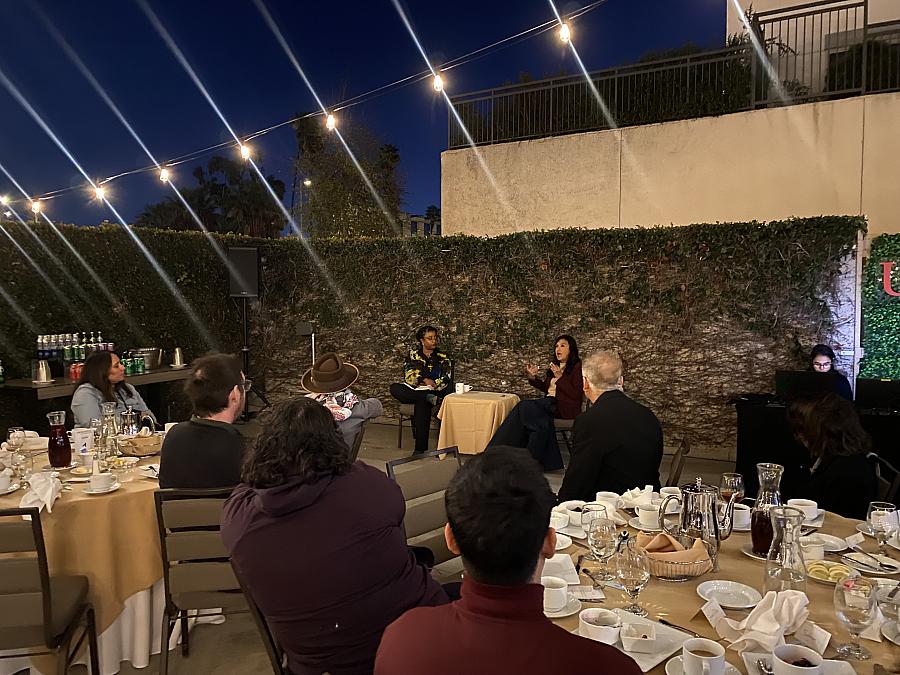California’s surgeon general summons lived experience for campaign on childhood adversity

(Photo by Teo Zac via Unsplash)
California’s surgeon general doesn't strain when searching for examples of what childhood adversity can look like — or how the right combination of caring adults might outshine the long shadow of early traumas.
Dr. Diana Ramos, an OB-GYN who was named the state’s first Latina surgeon general by Gov. Gavin Newsom in 2022, grew up in South Los Angeles with a single mother who immigrated from Mexico and worked three jobs to ensure her daughter could pursue the education she never had. Ramos remembers the daily struggles that unfolded around her.
“There were a lot of people that living in our one-bedroom apartment at one time, and they would be coming and going,” she recalled this week. “I grew up in the environment where the helicopter would come around in the middle of the night, I would wake up, and I would see my neighbor being arrested because he was beating up his wife, drank too much.”
Ramos recounted those early experiences during a keynote conversation with Priska Neely, a former California Fellow who serves as managing editor of Gulf States Newsroom, at the 2024 California Health Equity Fellowship in Los Angeles earlier this week.
“All of these issues really have provided me with the lived experience of knowing what the majority of people who are low-income, who maybe are struggling to make things happen in their lives, are going through, and so that’s why I chose to be a voice,” Ramos said.
As the state’s leading spokesperson on pressing public health issues, Ramos is picking up the torch of her predecessor, Dr. Nadine Burke Harris, who as the state’s first surgeon general strongly advocated for increased awareness and screening of adverse childhood experiences (ACEs), which are linked to a host of adult health outcomes and diseases such as alcoholism, heart disease and obesity. In 2021, the state passed new legislation that requires insurers to reimburse health providers for conducting ACE screenings.
Under Dr. Ramos, the surgeon general’s office has created an online training for teachers and child care providers that aims to help them recognize and respond to signs of trauma and toxic stress. A new app seek to provide young Californians with mental health support via smartphone. Looking ahead, Dr. Ramos said “a big PR campaign” from the state on ACEs and resources to address early trauma and stress is just around the corner.

California Surgeon General Dr. Diana Ramos, seated at right, speaks during a keynote conversation with Priska Neely, managing editor of Gulf States Newsroom, seated at left, at the 2024 California Health Equity Fellowship in Los Angeles on March 11.
“It’s supposed to start next month, for about six months, and it’s targeted to youth, to parents, and the third audience is health care providers,” she said, adding that the messaging was crafted with input from focus groups members from Black, Hispanic, LGBTQ+, tribal nation and rural communities. “What the campaign is doing is putting a mirror to the person’s face and saying this is what's happening in your life. And here are some resources that need you need to go get some support.”
The question of what kinds of treatments and support are available for someone who scores high on an ACE screening is a vital one. While California has reportedly done more than 2 million screenings since 2020, big questions remain on how many patients are receiving follow-up services and therapy based on the results, let alone how effective those treatments are in reversing adversity’s worst effects.
But Ramos believes the potential to prevent long-term health problems with proper treatment is huge. “Addressing adverse childhood experiences before the age of 18 helps prevent 44% of mental health disorders, 33% of tobacco use, and 24% of alcoholism, and many more chronic medical conditions,” she said, citing data posted by the CDC.
Addressing the state’s shortage of mental health services remains a work in progress, but relief may be on the horizon. California’s governor announced a sweeping $4.7 billion initiative in 2022 to overhaul the state’s mental health system and increase access to mental health services for kids. The Newsom administration says the initiative, part of a larger attempted overhaul of the state’s mental and behavioral health systems, will “create a pathway for 40,000 new mental health professionals, (and) offer tuition assistance and loan forgiveness for those who serve in behavioral health.”
The benefits of these policy changes and budget investments will take years to fully manifest. But meanwhile, there is already a remarkable consensus among early childhood and mental health experts on what makes the most important difference in the life of a young person undergoing stressful or traumatic early experiences — a strong relationship with a caring adult.
Dr. Ramos refers to such relationships as the “secret sauce” in combating adversity, pointing to the pivotal role played by her aunt during her childhood.
“Oftentimes people say or wonder, ‘How is it that you are where you are based upon where you came from?’” she said. “… For me honestly, it was one of my aunts, my tía, that lived across the way from us. I would come home as a latchkey kid and she would call me and she would say, ‘I saw you just got home. Come over here, I just made some cookies.’ She would sit me down and she would say, ‘OK, how was your day? Tell me what went wrong’.”
“It’s those kinds of things that helped build up resiliency.”

